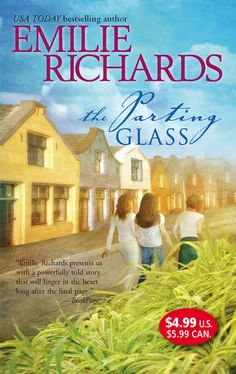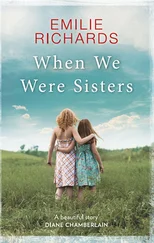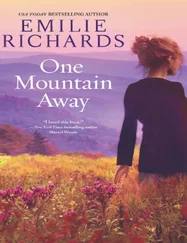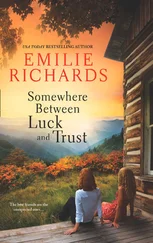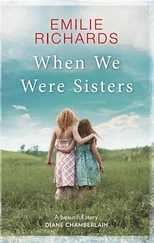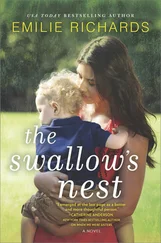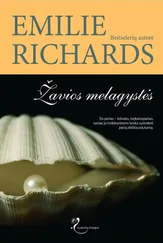Praise for the novels of
EMILIE RICHARDS
“(A) heartfelt paean to love and loyalty.”
—Publishers Weekly on The Parting Glass
“Well-written, intricately plotted novel….”
—Library Journal on Whiskey Island
“A flat-out page turner…reminiscent of the early Sidney Sheldon.”
—Cleveland Plain Dealer on Whiskey Island
“[Emilie Richards] adds to the territory staked out by such authors as Barbara Delinsky and Kristin Hannah with her hardcover debut, an engrossing novel…. Richards’s writing is unpretentious and effective.”
—Publishers Weekly on Prospect Street
“Richards pieces together each woman’s story as artfully as a quilter creates a quilt, with equally satisfying results, and her characterizations are transcendent, endowed with warmth and compassion.”
—Booklist on Wedding Ring
“(A) heartwarming, richly layered story.”
—Library Journal on Endless Chain
“Richards stitches together the mystery of a family’s past with the difficulties and moral dilemmas of the present for a story as intriguing as the quilt itself.”
—Publishers Weekly on Lover’s Knot
Emilie Richards
the Parting Glass
My thanks to fellow writers Karen Young, Diane Chamberlain and Patricia McLinn for their affectionate support and feedback during the creation of The Parting Glass, and to Damaris Rowland for her insights and suggestions. I’m grateful, too, for Madelyn Campbell’s considerable medical expertise and her willingness to share it.
A very special thank-you to all the readers who asked me to continue the Donaghue story, and particularly those at Cleveland’s Irish Cultural Festival who related their personal stories of Whiskey Island and prodded me to look into Cleveland’s bootlegging past and mysterious tunnels.
Special thanks to Michael McGee, who accompanied me on two research trips to County Mayo during particularly rainy weather and almost never complained. And as always, thanks to my talented editor, Leslie Wainger, who never fails to inspire and encourage.
Of all the money ere I had,
I spent it in good company,
And all the harm I’ve ever done,
Alas was done to none but me
And all I’ve done for want of wit,
To memory now I can’t recall
So fill to me the parting glass,
Good night and joy be with you all.
Of all the comrades ere I had,
They’re sorry for my going away,
And all the sweethearts ere I had,
They wish me one more day to stay,
But since it falls unto my lot
That I should go and you should not,
I’ll gently rise and softly call,
Good night and joy be with you all.
(This is a traditional Irish ballad for singing at the end of an evening, a gathering or an event. One of Ireland’s most popular, it is documented as far back as the 1770s.)
prologue
chapter 1
chapter 2
chapter 3
chapter 4
chapter 5
chapter 6
chapter 7
chapter 8
chapter 9
chapter 10
chapter 11
chapter 12
chapter 13
chapter 14
chapter 15
chapter 16
chapter 17
chapter 18
chapter 19
chapter 20
chapter 21
chapter 22
chapter 23
chapter 24
chapter 25
chapter 26
chapter 27
chapter 28
chapter 29
chapter 30
chapter 31
chapter 32
chapter 33
chapter 34
chapter 35
chapter 36
chapter 37
chapter 38
chapter 39
chapter 40
epilogue
1923
Castlebar, County Mayo
My dearest Patrick,
So many years and so many miles separating us, dear brother. For centuries we McSweeneys knew nothing of loneliness but everything of each other. And what else was there to know? What else is there in the end but family, land and church? The rest is like butter on bread, mere pleasure with little nourishment.
Now our family has been dumped like ship’s ballast on distant shores. You in Ohio, our dear sisters in Australia, Nova Scotia and the grave. We are old, all who remain, and separated by much more than miles. We know so little of each other now. I have the new photograph that St. Brigid’s made for you, and I thank you for sending it, but what happened to the young man I knew, so straight and tall? What happened to the priest with fire in his gaze and vitality in his step? Has he gone the path I’ve trod myself? The path that leads to only one destination?
I cannot imagine you as an old man, dear Patrick. You only celebrate Mass on Holy Days, hear confession but infrequently, read for hours each day and contemplate? What exactly do you consider now that your time is your own, my brother? The years you have already lived? The green island of your birth? Our dear, dear land that McSweeneys will never work again?
Perhaps, had I married, I might find more to do with my own time. I would have grandchildren and great-grandchildren, and I would dandle them proudly on my knee. Instead, with no family to succeed me, I think only of the family from which I came, of you and Ciara and Selma, of dear Una who was with us such a short time. Not a one of us with offspring of our own, and a long proud line in ashes at out feet.
I remember all, even at this final juncture of my life. I remember songs and laughter, the fragrance of bread baking on a stone hearth, the bleating of sheep in our paddock. I remember a small lad tugging at my skirts, saying his prayers with a childish lisp, cowering behind closed doors for fear of the boogeyman on nights when Mayo’s bog land was cold and misty.
How fortunate I am to have these memories to comfort me. How fortunate are all who have had family to cherish. This can never be taken from us, dear Patrick. No matter the years that separate us, you and all our loved ones are always with me.
Your sister,
Maura McSweeney
Peggy Donaghue avoided the parking lot of the Whiskey Island Saloon whenever she could, which wasn’t easy since she lived directly above it. On days when there was no parking on the street, she reluctantly took the reserved spot closest to the back door and sprinted for the kitchen. She wasn’t superstitious. She just didn’t believe in tempting fate.
Not unless the circumstances were exceptional.
The young man standing just behind her cleared his throat. “It’s real windy, Ms. D. You don’t have to stay out here. Nothing’s going to happen, I promise.”
Peggy pulled her long chestnut hair into a temporary ponytail so it would stop whipping into her eyes. Over one shoulder she could see that Josh, tall, lanky and clearly uncomfortable, wasn’t looking at her. That was understandable. Josh had just stolen his very first car. He was praying, just as Peggy was, that the owner wouldn’t realize his brand-new Honda Civic was missing.
“I trust you, Josh. And I even trust them.” Peggy nodded to the group of four adolescent boys who were poring over the car like melted butter on the saloon’s Friday night pierogi special. “But I’ll just stay here in case they need me.”
“Nick was locked away in his study. When he gets like that, he doesn’t know what’s going on. He’s not going to know.” Josh’s tone was less certain than his words.
“He’s probably got stuff to do before he leaves town.” Peggy saw a familiar figure coming up between the rows of cars. The willowy strawberry blonde was unmistakable—and related. “Uh oh, we’ve been nailed,” she said in her best Jimmy Cagney imitation. “It’s the calaboose for us now, Scarface.”
Читать дальше
